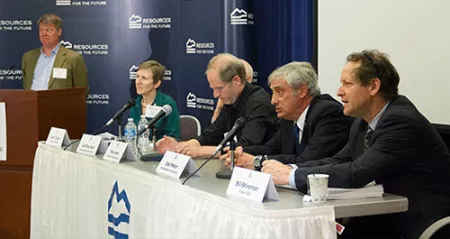Last Monday on May 6, SESYNC’s Research Program Manager Jessica Marx and Environmental Science Research Assistant Kelly Hondula attended an event at Resources for the Future, co-sponsored by SESYNC, entitled “Responding to Ecological Loss: The Promise and Limits of Ingenuity.” This interdisciplinary and diverse panel—moderated by SESYNC Director of Social Science & Policy, Jim Boyd—brought together scholars, policymakers, and business folks to discuss how technological advancement and conservation priorities can work in concert with each other rather than as opposing forces. When faced with looming ecological loss, can technological innovation develop solutions to vast environmental problems? The panelists tackled this question through a variety of lenses—from scholarly disciplines ranging from economic history to psychology, and from both an NGO and corporate perspective.
Examining the value of nature from historical and psychological perspectives can provide insight into decision-making processes that influence and alleviate present-day problems. The economists argued that the historical loss of natural capital progressed alongside advancements in intellectual and social capital, although at a great cost. A contradiction that the panelists tried to resolve was: as natural capital is lost and ecological resources are degraded, do we value what is left more due to scarcity, or less due to generations adopting new baselines of what is acceptable? The value of nature has certainly shifted over time—not only its economic value, but its inherent and biophysical values. As a psychologist on the panel noted, our perception of what is nature has shifted too—from something “out there,” whether we classify nature as the wilderness or as something we humans are a part of, to even the development of “technological” natures that attempt to mimic natural objects and landscapes.
This discussion made clear that the value of nature spans disciplines and cannot be accurately represented by traditional market ideology. Although we intuitively know that values such as ethics, emotion, and the importance of biodiversity shape our decision-making processes, these forces aren’t currently accounted for in the price signals that have historically led to losses in the natural functioning of socio-environmental systems. The psychologists argued that it would be incredibly naïve to think that we even understand the full extent of the value we’ve lost in ecosystems. Therefore, assigning economic value to resources cannot be the only method we use to combat ecological loss. This idea brought consensus among the panelists: innovation and ingenuity of institutions rather than of technology is where the best opportunities lie in tackling lost ecological functions.
Using the market to value assets is our “normal” approach, but it is only one tool with which we can approach socio-environmental systems. And historically, this method has not been able to develop the social capital necessary to collectively solve our environmental issues that are inherently rooted in a social world. Instead, we need to broaden our understanding of how collective action, cooperation, and trust can be innovative solutions to address society’s needs while maintaining natural systems.
View video of the entire seminar below:
